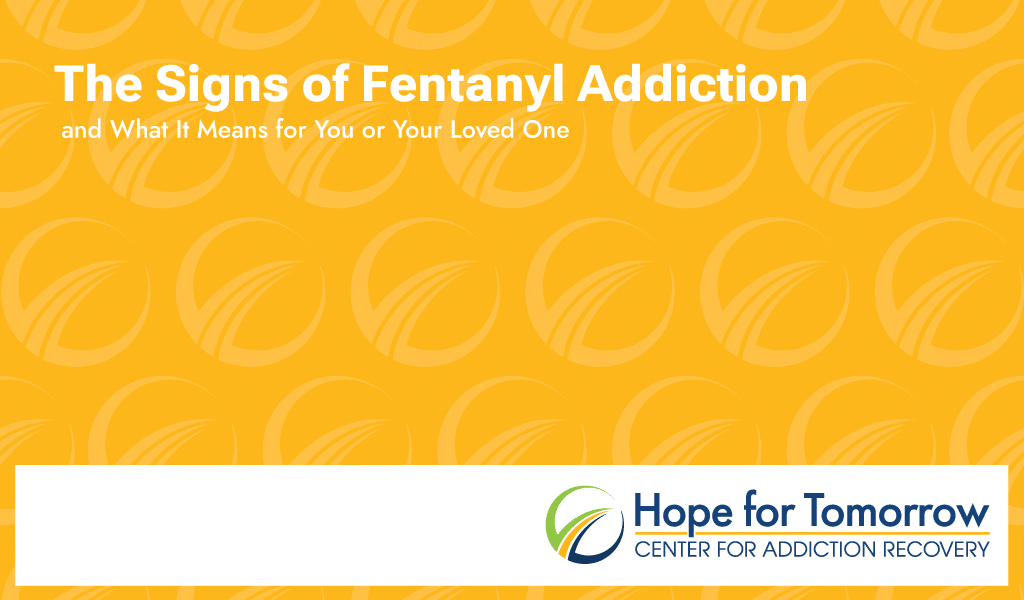

If you keep your eye on the news, the opioid epidemic is a frequent topic. In 2021, there were 1,417 deaths due to illicit substances in West Virginia. 1,201 of those were due to opioids.
The equivalent of three grains of salt is enough for many people to overdose on fentanyl, so its danger is undeniable. At Hope for Tomorrow, we offer care for people with fentanyl use disorder and provide support even after they complete their treatment programs. These deaths are 100% preventable, and walking away from Fentanyl is possible.
Fentanyl overdose and related deaths are avoidable, but it’s hard to intervene and find help for people with fentanyl use disorder without knowing what it looks like. Here are the signs of fentanyl addiction to keep an eye out for.
While many people try to hide their fentanyl use, there are still unavoidable physical, behavioral, and psychological changes that happen due to the substance. Some are visible, and some aren’t.
No one person with a fentanyl use disorder is the same. That means everyone will act a little differently when taking it. Still, when fentanyl starts taking over people’s lives, their performance at work and school will suffer, and their ability to fulfill their regular responsibilities will, too. They might borrow or steal money, and become secretive about their whereabouts.
Often, people with fentanyl use disorder will isolate themselves from friends and family, and ignore hobbies they used to enjoy. As their fentanyl use disorder progresses, they might go to great lengths to find more fentanyl. Maybe they’ll search for ways to find fentanyl online, and try to obtain fentanyl, either legally or illicitly, from medical professionals.
While the initial dose of fentanyl comes with euphoria, developing a fentanyl use disorder comes with far more negative psychological changes than pleasant ones. It takes a toll on every area of the body, including the brain. Fentanyl can exacerbate pre-existing mental health conditions, which often go hand-in-hand with substance use disorders. Depression is common, sometimes to the point of suicidal ideation. Anxiety and paranoia can come along with it, too.
One of the most noticeable impacts of fentanyl use disorder is gaining or losing weight. Fatigue is also common, as are constipation and reproductive problems. The biggest risk that comes with long-term fentanyl use is an overdose, which is life-threatening.

“Drug-seeking behavior” encompasses what people do to obtain their substance of choice. For example, “drug-seeking behavior” would be someone visiting multiple doctors in an attempt to get a fentanyl prescription. Even though this behavior isn’t legal and medical professionals shouldn’t enable it, it’s unnecessarily stigmatized and looked down upon. People exhibiting “drug-seeking behavior” aren’t bad people. They need support and treatment for their substance use disorder.
Most people with fentanyl use disorder will experience withdrawal when they stop taking fentanyl. The pain that comes with fentanyl withdrawal is one of the major reasons why fentanyl use disorder is so hard to beat without help. Some symptoms of withdrawal include:
Anyone can develop a fentanyl use disorder. There’s no single cause, and someone living with every risk factor for fentanyl use disorder may never have one. There are some frequent patterns in people who live with fentanyl disorder, though.
People often fall into illicit fentanyl use to cope with stress, trauma, or symptoms of undiagnosed mental health conditions. There is also a potential genetic component, and people with family members who use substances illicitly are more likely to do the same thing.
Fentanyl is a prescription medication first and foremost, and sometimes, people who take it as intended develop a dependence and fentanyl use disorder. It’s important to take fentanyl exactly as your doctor directs to lower the chance of this happening.

Fentanyl use disorders come with a unique danger other substances don’t. Even if you know that, fear alone doesn’t make it any easier to stop using fentanyl illicitly. Withdrawal symptoms and cravings are incredibly difficult to deal with alone. Thankfully, you don’t have to. Fentanyl addiction treatment is accessible, and recovery is within reach, no matter who you are.
At Hope for Tomorrow, located in West Virginia, we work closely with people with fentanyl use disorders to empower them to overcome their condition. You might think you’re a lost cause or too far gone, but that isn’t the case. We accept everyone in need, no matter the severity of your fentanyl use disorder and the impact it’s had on your life. It’s never too late to seek treatment for your fentanyl use disorder. Call us at 877-679-8162 today to get started.
Treatment today for a brighter tomorrow.